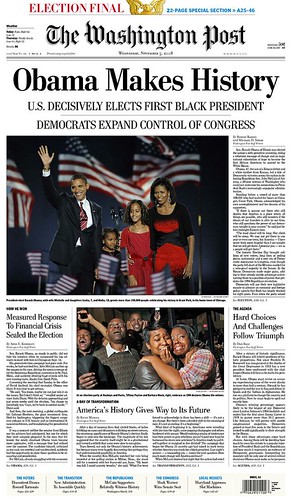There was a flurry of activity following the botched 2000 election, not the least of which was a resurgence of calls for reform or abolishment of the Electoral College. The bugaboo is, the Electoral College is not an easy dragon to slay, simply because its existence is written into the US Constitution. Legislation to amend or abolish it cannot even leave Congress without a 2/3 majority vote in favor.
In my quest to educate myself about the College, I’ve called up several articles from different viewpoints. One thing I’m now convinced of, major objections to the Electoral College system don’t come primarily from one party or the other. They may come from whichever party feels most injured by it at a particular time…but the beauty of the Electoral College is that it is indiscriminate in whom it screws. It doesn’t come down more heavily on the side of Democrats or Republicans, conservatives or liberals. This fact alone gives it a certain appeal…
Oddly enough, in my research, I came across articles written in October of 2000, slamming the Electoral College because of a potential problem looming for the 2000 election: George Bush was the projected winner of the popular vote, but it seemed likely that Al Gore might take the election without winning the majority of the popular vote, by virtue of having slim popular vote leads in eleven "swing" states. In an op-ed piece for the Daily Herald (a string of suburban Chicago newspapers) Burt Constable wrote,
If most American voters cast ballots for George W. Bush, but Al Gore still manages to end up in the White House, folks would suspect the election was fixed.
But that scenario is possible unless we fix our flawed Electoral College system. By barely beating Bush in 11 key states, Gore could capture the 270 Electoral College votes needed to lock up the presidency, even if the overwhelming majority of our nation's voters select Bush. (I wonder, after what actually came to pass, did he jump up and scream that the election had been fixed?)
Just to prove that Mr. Constable’s pre-election predictions were not as off-base as it would seem, this was written by Steven Hill, western regional director for The Center for Voting and Democracy, also in October of 2000:
So George Bush may win more popular votes nationwide, but Al Gore could win more popular votes in enough key states to amass enough Electoral College votes to become president. If that happens, count on a big disconnect between an already disengaged public and our national politics.
AFTER the election, Hill wrote this:
Democrat Al Gore won more votes than Republican George Bush in the national popular vote. But Bush may be on his way to the White House.
Blame for this democratic anomaly rests squarely with that 18th-century anachronism, the Electoral College. The Electoral College is a clumsy device that never would be imitated by a state for electing its governor -- or by a town electing its dogcatcher. It has been the subject of more proposed amendments than any other part of our constitution, but like an appendix, we keep it because it hasn't ruptured... yet. (At least I give this guy credit for the taking system to task regardless of whom it screwed…)
The main objections to ditching the system seem to come from people who are, or would like to project themselves as, Constitutional scholars. These folks have a tendency to hold the Constitution in such reverence that they believe nothing short of an act of God should change a word of it. They explain away the outdated reasoning behind the system with statements like,
"The fact that the Electoral College was originally designed to solve one set of problems but today serves to solve an entirely different set of problems is atribute to the genius of the Founding Fathers and to the durability of the American federal system."
(From the essay on the FEC website, by William C. Kimberling, Deputy Director, FEC Office of Election Administration.) Kimberling’s article itself states the constitutional controversy that that lay behind the formation of the Electoral College System:
"In order to appreciate the reasons for the Electoral College, it is essential to understand its historical context and the problem that the Founding Fathers were trying to solve. They faced the difficult question of how to elect a president in a nation that:
- was composed of thirteen large and small States jealous of their own rights and powers and suspicious of any central national government
- contained only 4,000,000 people spread up and down a thousand miles of Atlantic seaboard barely connected by transportation or communication (so that national campaigns were impractical even if they had been thought desirable)
- believed, under the influence of such British political thinkers as Henry St John Bolingbroke, that political parties were mischievous if not downright evil, and
- felt that gentlemen should not campaign for public office (The saying was "The office should seek the man, the man should not seek the office.")."
Remember, our Founding Fathers had their roots in the "class" system of Europe, primarily England. They were born Englishmen, and became Americans by virtue of the American Revolution. Not long after their own revolt, they witnessed the disaster of the French Revolution, which put too much power directly into the hands of an uneducated and long-oppressed populus, with the ultimate result of ensuing anarchy, followed by the rise of a military dictator who became the scourge of Europe.
The platform of our government was freedom and democracy, but not pure democracy. Not the "one man, one vote" definition of democracy that we think we have in this country today. The government was set up in a very complicated fashion, with its three branches, and the checks and balances thereof. But it was really more set up to carry out the will of the states, and thereby the will of the people in an indirect way.
Don’t forget, the original Constitution provided for senators to be appointed by the state legislatures, NOT by popular vote. I think if you told James Madison that old Clyde from up in the shack on the hill was going to roll on into town on election day and scribble his "X" on the bottom of a ballot for the senate or the presidency, Mr. Madison would faint dead away. Government was a gentleman’s business, which our Constitutional framers took for granted would be kept in the hands of gentlemen of means and education. I don’t think they consciously kept power out of the hands of common people. I think they simply believed that the choices involved in a society’s attempt to govern itself were important enough to require a certain degree of education and aptitude for complex reasoning. I can’t really argue with that, given what passes for political rhetoric and "important" issues, these days…
Okay, enough for today. Tomorrow I’ll wrap up and put forth some suggested alternatives…


















We can't get rid of the electoral college except by amending the constitution. But, (big but) several states allocate their electoral votes in the same percentages as the popular vote. It might be easier to change the allocations on the state level. At least that would short circuit the claims by the winners that they have a "landslide" when they only have slightly more than half of the vote.
ReplyDeleteI await your alternatives with baited breath.
ReplyDeleteI really do.
~~mumsy
Thanks for all the work you put into this. Interesting read.
ReplyDeleteYou're too much! Thanks for all the info.
ReplyDeleteHate to split hairs but we are a Republic, not exactly a democracy. We have Repesenitives. Bt the way I responded to your next enty before reading this. I guess you were pretty fair about the Al Gore JR deal. A lot of folks dont remember the pre election buzz about Bush winning the popular vote, but not the electorial vote. I do. You have to think though, if Gore wasnt smart enough to know he was being bluffed about losing California, keeping him out of other up for grab s=tates, was he smart enough to be president. Also...i think if most Democrats actually thought Gore was screwed by the system, not just lame, they would have re-run him this year in stead Mr.Kerry. Also the same democrats that praise liberman as Washington like in statesman ship in 2000 gave him the boot pretty damn quick in 2004
ReplyDelete